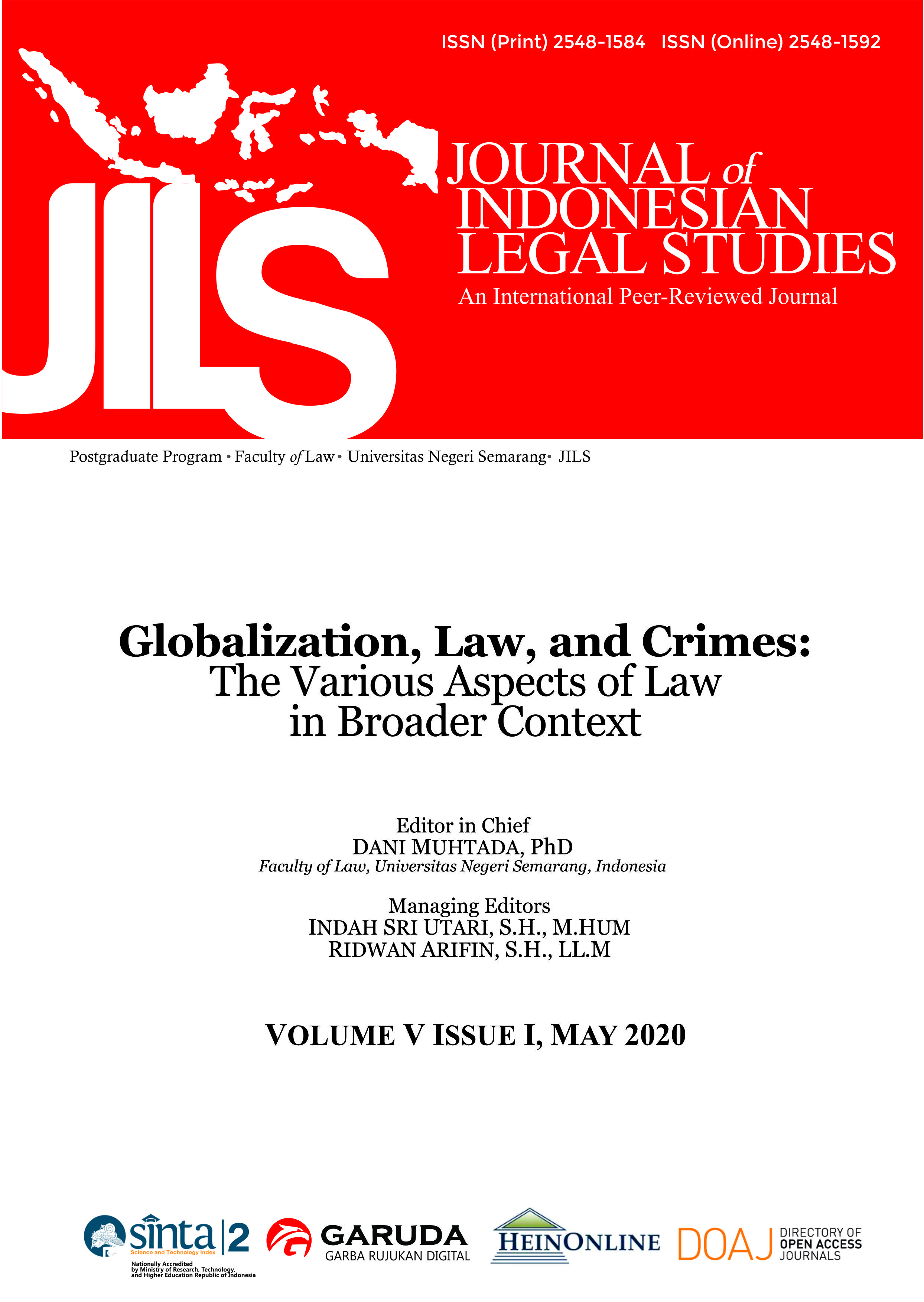Criminal Policy of Adultery in Indonesia
Main Article Content
Abstract
Judge courage needed in deciding adultery cases in article 284 of the Criminal Code for perpetrators who have not been bound by marriage, the judge can apply based on the 1945 Constitution and the Law on Judicial Power, which states the source of law is not only the Law (expansion of the principle of material legality) but can also source from code that lives in the community (customary law). This research is intended to analyze and describe the penal policy (criminal law policy and politics of criminal law) concerning adultery in Indonesia. This research uses normative legal research, where the Author analyze and compare all laws and regulations concerning to adultery in Indonesia and some theories of adultery in global context. This paper emphasized that adultery not only against religious values but also customary values (customary law). The formulation of adultery concept in Indonesian Penal Code affected by religious teachings and national ideology of Pancasila.
Article Details

This work is licensed under a Creative Commons Attribution-ShareAlike 4.0 International License.
All writings published in this journal are personal views of the authors and do not represent the views of this journal and the author's affiliated institutions. Author(s) retain copyrights under the licence of Creative Commons Attribution-ShareAlike 4.0 International (CC BY-SA 4.0).
References
Arief, B. N. (2012). Pembangunan Sistem Hukum Nasional. Semarang: Pustaka Magister.
Arief, B. N. (2016). Bunga Rampai Kebijakan Hukum Pidana. Jakarta: Kencana.
Bennett, C. (2019). The authority of moral oversight: On the legitimacy of criminal law. Legal Theory 25(3), 153–177. https://doi.org/10.1017/S1352325219000119
Casper, J. D., & Brereton, D. (1984). Evaluating Criminal Justice Reforms. Law & Society Review 18(1), 121. https://doi.org/10.2307/3053483
Davies, H. T. O., Nutley, S. M., Smith, P. C., Nutley, S., & Davies, H. (2012). Criminal justice: using evidence to reduce crime. In What works?Evidence-based policy and practice in public services (pp. 92–116). https://doi.org/10.1332/policypress/9781861341914.003.0005
Kalvodová, V., & Žatecká, E. (2014). Unfair Competition and its Possible Criminal Sanctions. Procedia Economics and Finance 12(40), 283–287. https://doi.org/10.1016/S2212-5671(14)00346-3
Latifiani, D., Widyawati, A., Fibrianti, N., & Ningsih, A. S. (2020). Advocate as law enforcer in the implementation of e-court. International Journal of Innovation, Creativity and Change 11(4), 439–449.
Marenin, O. (2019). The tragic core of criminal justice: Coercive social control and the loss of innocence. International Journal of Law, Crime and Justice 58(August 2018), 91–99. https://doi.org/10.1016/j.ijlcj.2019.04.003
Marquenie, T. (2017). The Police and Criminal Justice Authorities Directive: Data protection standards and impact on the legal framework. Computer Law & Security Review 33(3), 324–340. https://doi.org/10.1016/j.clsr.2017.03.009
Miao, M. (2016). Two years between life and death: A critical analysis of the suspended death penalty in China. International Journal of Law, Crime and Justice 45(1), 26–43. https://doi.org/10.1016/j.ijlcj.2015.10.003
Moh. Mahfud. Md. (2019). Politik Hukum Di Indonesia. Jakarta: PT Raja Grafindo Persada.
Mulyadi, D. (2017). Unsur-Unsur Penipuan Dalam Pasal 378 KUHP Dikaitkan Dengan Jual Beli Tanah. Jurnal Ilmiah Galuh Justisi 5(2), 206. https://doi.org/10.25157/jigj.v5i2.798
Mungan, M. C. (2017). The certainty versus the severity of punishment, repeat offenders, and stigmatization. Economics Letters 150(1), 126–129. https://doi.org/10.1016/j.econlet.2016.11.030
Necula, M. I. (2014). Aspects Concerning the Penal Protection of the Freedom of Religious Beliefs. Procedia - Social and Behavioral Sciences 149, 639–646. https://doi.org/10.1016/j.sbspro.2014.08.241
Perales, C. M. (2014). Criminal Enforcement of Environmental Laws. In Encyclopedia of Toxicology (3rd Edition, Vol. 1, pp. 1066–1069). Elsevier. https://doi.org/10.1016/B978-0-12-386454-3.00481-4
Persak, N. (2019). Beyond public punitiveness: The role of emotions in criminal law policy. International Journal of Law, Crime and Justice, 57(February), 47–58. https://doi.org/10.1016/j.ijlcj.2019.02.001
Roach, K. (1999). Four models of the criminal process. Journal of Criminal Law and Criminology 89(2), 671. https://doi.org/10.2307/1144140
Rustigan, M. A. (1980). A reinterpretation of criminal law reform in nineteenth century England. Journal of Criminal Justice 8(4), 205–219. https://doi.org/10.1016/0047-2352(80)90001-X
Schröder, T. (2019). Corporate crime, the lawmaker’s options for corporate criminal laws and Luhmann’s concept of “useful illegality.†International Journal of Law, Crime and Justice, 57(December 2018), 13–25. https://doi.org/10.1016/j.ijlcj.2019.01.004
Simon, J. (2002). Introduction: Crime, Community, and Criminal Justice. California Law Review 90(5), 1415. https://doi.org/10.2307/3481360
Syarifin, P. (2000). Delik Perzinahan Hukum Pidana Di Indonesia. Jakarta: CV Pustaka Setia.
Szczucki, K. (2018). Ethical legitimacy of criminal law. International Journal of Law, Crime and Justice, 53(January), 67–76. https://doi.org/10.1016/j.ijlcj.2018.03.002
Volk, S., Nguyen, H., & Thöni, C. (2019). Punishment under threat: The role of personality in costly punishment. Journal of Research in Personality 81(1), 47–55. https://doi.org/10.1016/j.jrp.2019.05.005
Widyawati, A. (2016). Penal Mediation As An Alternative Dispute Resolution Of Social. 9(4), 44–49.
Widyawati, A. (2019). Regulations of penitentiary law in indonesia. International Journal of Business, Economics and Law 18(4), 53–59.
Widyawati, A. (2019). Pendekatan Restorative Justice Sebagai Upaya Penyelesaian School Bullying. Yustisia Jurnal Hukum 3(3), 27-37.
Widyawati, A. (2015). Akar Konflik Dalam Masyarakat Multikultural di Karimunjawa. Yustisia Jurnal Hukum 93(3), 602–616. https://doi.org/10.20961/yustisia.v93i0.3688
Yankah, E. N. (2019). Race, Criminal Law and Ethical Life. In The Palgrave Handbook of Applied Ethics and the Criminal Law. Cham, Switzerland: Palgrave Macmillan, (pp. 625–648). https://doi.org/10.1007/978-3-030-22811-8_26
